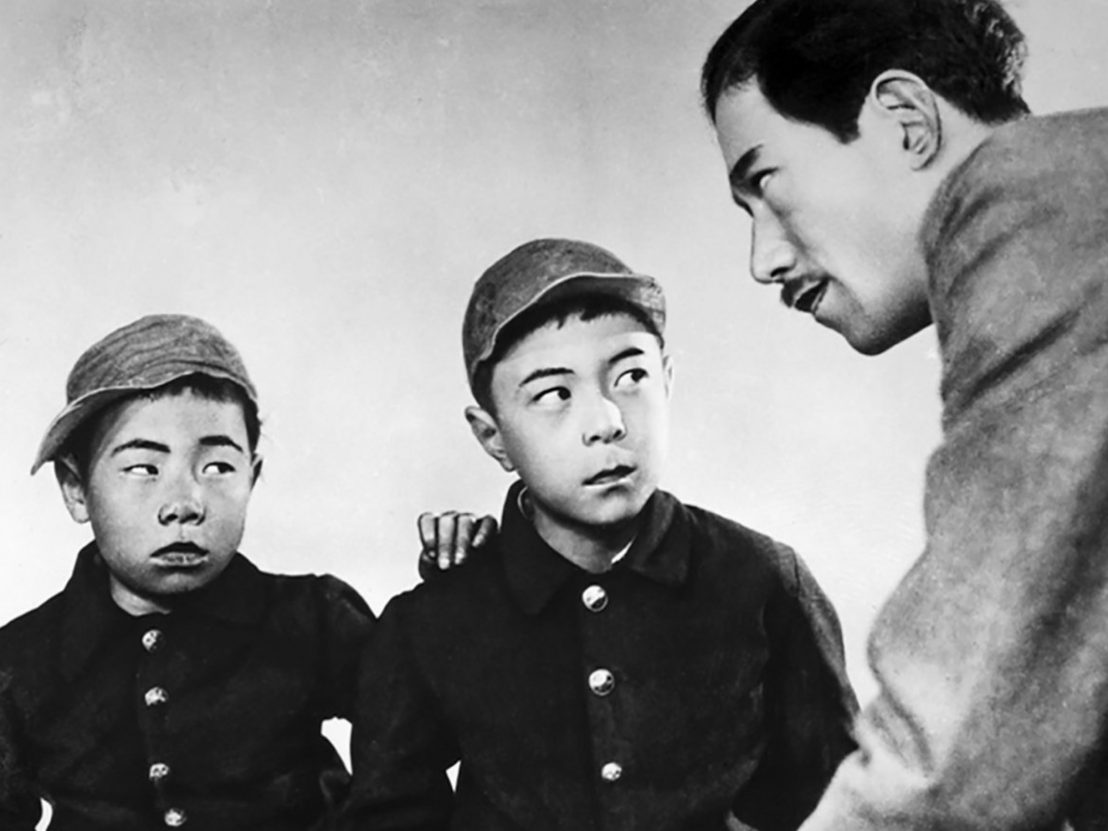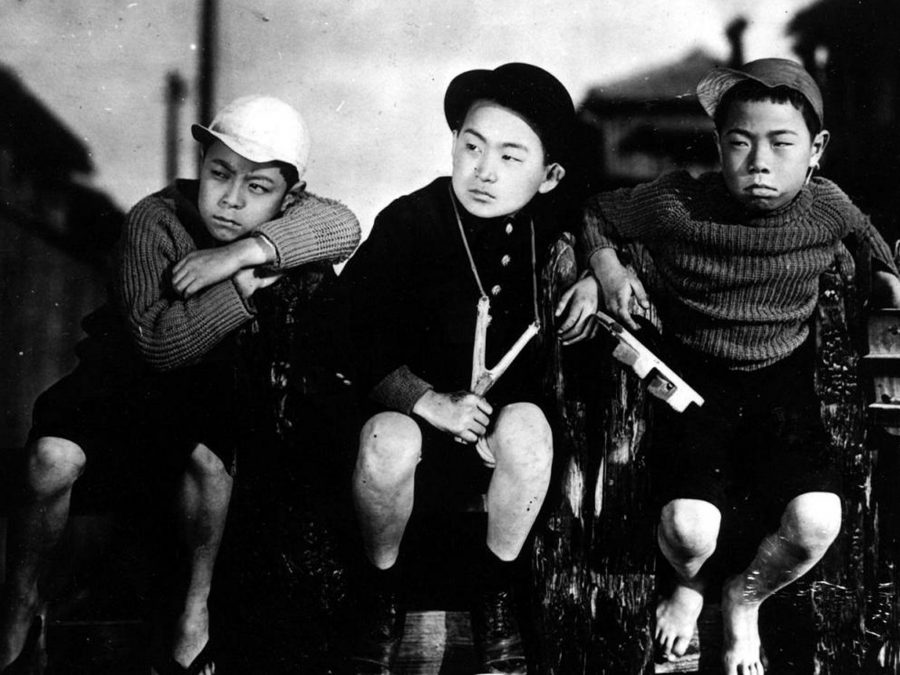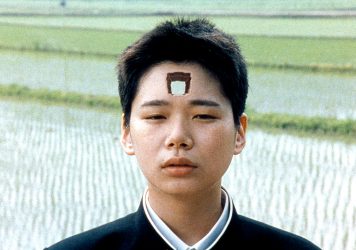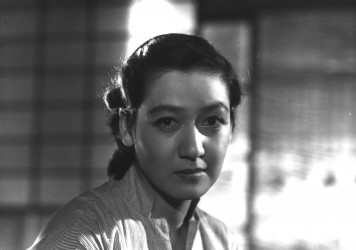
“Life’s tragedy begins with the bond between parent and child.” That epigraph, found at the opening of Yasujirō Ozu’s first talkie, The Only Son, could easily appear before any of his 54 feature films.
Fathers and sons, daughters and fathers, mothers and daughters – few filmmakers have so repeatedly evinced the perpetual disappointments that form between parents and their progeny, whether it’s the dashed hopes an impoverished silk-mill worker holds for her titularly singular child in The Only Son, or the permanent split an arranged marriage wedges between a father and daughter in Late Spring. Time and time again Ozu positions the familial bond as a contract destined to be mismanaged and broken, with no crack running deeper than that forged by failed expectations.
And so it goes in his 1932 silent feature, I Was Born, But…, a film that interrogates the hierarchical ladder of bootlicking at the backbone of white-collar workplaces and the impact such salary-mandated brown-nosing has on family morale. Perhaps best known as the inspiration for Ozu’s decades-later colour remake Good Morning, I Was Born, But… transforms the economic downturn of early 1930s Japan into the staging ground for a comedic inversion of family tropes – instead of a disappointed parent, the narrative centres around two children’s disillusionment upon witnessing their otherwise respectable father’s self-abasing behaviour towards his boss. What they fail to see, however, is how they trade in the same social signifiers during their interactions with their peers.
On paper, the Yoshis read as the quintessential lower-middle-class Japanese family. There’s the family patriarch and bread-winner Kennesuke (Tatsuo Saitō); the doting mother and housewife Haha (Mitsuko Yoshikawa); and the two young brothers Keiji and Ryoichi (Tomio Aoki and Hideo Sugawara), separated only by a couple of years and tied together by their mirror-image goofery and resolute respect for their father. But change is afoot. We join the family as they’re part-way through migrating to the suburbs of Tokyo – a move born of the economic downturn facing much of metropolitan Japan after a series of banking crises and the rippling international impact of The Great Depression.
Unsurprisingly, that move isn’t the cure-all Mr Yoshi hopes for. I Was Born, But… opens with a tight closeup on a wheel stuck in the mud, turning endlessly in place. Cutting to a medium long shot, Ozu reveals two sullen boys sat atop a ramshackle truck full of shoddily roped together possessions, scowling at the truck’s attempts to free itself. Despite the additional weight their loafing adds to the load their dissatisfaction with the truck’s spinning is evident. The later revelation that this entire move is one motivated by corporate wheel-greasing – less an idyllic break from city life than a chance for Mr Yoshi to roost closer to his boss, Mr Iwasaki (Takeshi Sakamoto), and therefore improve his career prospects – further contextualises the boys’ contempt for kowtowing.
That rudimentary perception of the world – trucks are designed to provide transit, fathers are designed to lead by example – inevitably shapes the boys’ integration into the suburban community. It doesn’t take long for the pair to run into the local lads, a mix of ages and economic backgrounds who move around in one cohesive unit. Here, the biggest boy acts as the leader, his brute strength and size signifying a more archaic form of authority and its laddering.
But it’s the wealthy, well-dressed boy Taro (the son of Mr Yoshi’s boss, no less) that actually pulls the strings. Forever at the ear of his larger compatriot he coaxes him into boffing Keiji on the head, swiping his toy in the process as two smaller goons swoop in and steal his bread. In that moment we have a potent delineation of power; the bread, representing the essentials necessary to all, and the toy, representing greater affluence and disposable income. Without paying their dues and expected respect, the newcomers aren’t worthy of either.

Those same power plays are present in the first meeting between Mr Yoshi and Mr Iwasaki, albeit premised on subliminal cues rather than fisticuffs. Ozu perpetually pins Mr Yoshi’s line of sight to Mr Iwasaki’s off-screen presence, his hat held limply in hand (covering his groin, no less) with his body tilted forward. That plays in stark contrast with Mr Yoshi’s stern demeanour at home, a space where Keiji and Ryoichi yield to their father with the same deferential body language that he does his boss. When the pair are caught bunking off from school, they lower their heads till their chins touch their chests before falling to their knees, sprawled and jelly-like in total capitulation. When their father later catches them running from the school gates, they bow and tip their caps in a show of reverence.
The film’s central conflict emerges much later when the gang of boys – the two Yoshi brothers now well-established in the pecking order – sit in on a showing of home movies at Mr Iwasaki’s house, curated for his closest subordinates. At one point during the screening – a series of videos that reaffirm Mr Iwasaki’s wealth, depicting grand statues and days spent playing tennis on a private court – Mr Iwasaki reaches for a cigar, darting a glance to the side to see which of his underlings will proffer him a match first. Of course, it’s Mr Yoshi.
But the breaking point is far more excruciating. The tail end of the screening reveals Mr Yoshi’s drastically different demeanour in the office, Ozu cutting between over-the-shoulder perspective shots and reaction shots to convey the change in tone. Worse than being meek, Mr Yoshi is shown to be the class clown, gurning his way through the company’s daily callisthenics to raucous laughter, on-screen and off. At first his sons laugh too, before attempting to contextualise what their father’s performance means, their eyes swinging left and right to meet the reactions of the room. Their father’s childish buffoonery diminishes his stature in their eyes from patriarch to crony, no different than one of their peers. The role of the court jester may curry favour but it loses respect.
“Why do you have to bow so much to Taro’s father?” It’s a reasonable question, but one Mr Yoshi struggles to answer. Deflated in the dark of his own home he resorts to drinking instead, no longer the jester, no longer the authoritarian head of the household. “I know how they feel,” is all he can summon up. “It’s a problem these kids will face all their lives.” But despite these suspicions, the next day he urges them to break the cycle of obsequiousness, hoping that his slavish persistence in rising the ranks might enable them some greater wealth and influence: “Don’t become miserable ankle polishers like me boys”.
As to whether such change is possible, Ozu leaves things ambiguous, closing on a scene where Keiji and Ryoichi urge their father to go and wish his boss a good morning. The game might never end, but the two brothers are beginning to learn the rules.
Published 19 Jul 2022

By Anton Bitel
The Taste of Tea marks an intriguing departure from director Katsuhito Ishii’s earlier Tarantino-esque capers.

The shining star of movies by Ozu, Naruse and Kurosawa has died at the age of 95.